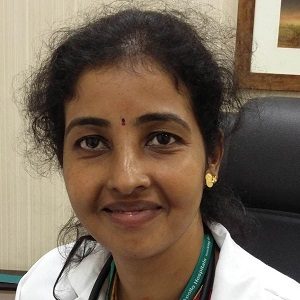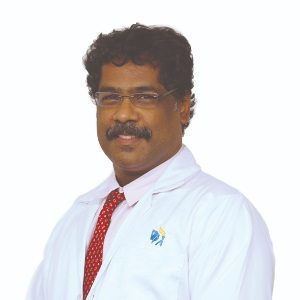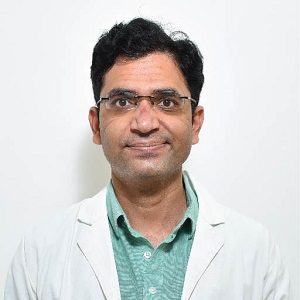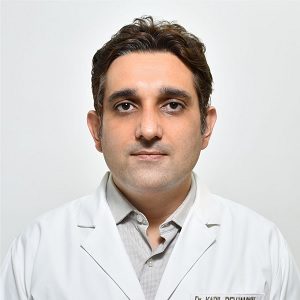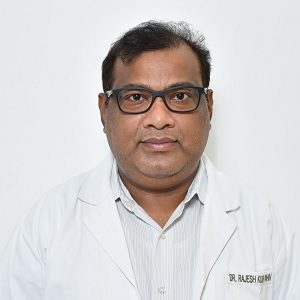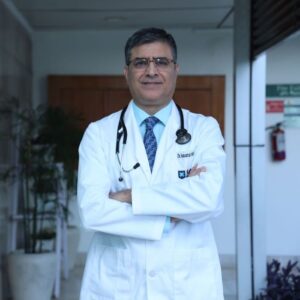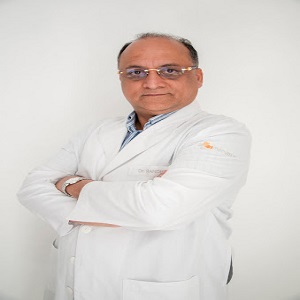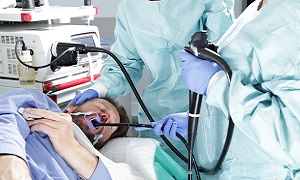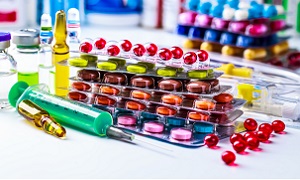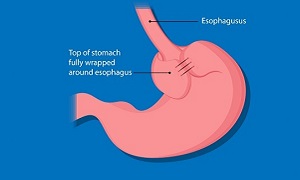Best Doctors in India for GERD Treatment
- Gastroenterologist and GI Medicine Specialist, Chennai, India
- Over 18 years’ experience
- Apollo Hospitals Greams Road
Profile Highlights:
- Dr. Preethi M is one of the best gastroenterologists in India, with 18 years of expertise.
- Dr. Preethi received many awards for her contribution to the field.
- She offers consultation for Irritable Bowel Syndrome (IBS), Hemorrhoids, Endoscopy, female problems, and other gastrointestinal issues.
- Gastroenterologist and GI Medicine Specialist, Chennai, India
- Over 23 years’ experience
- Apollo Hospitals Greams Road
Profile Highlights:
- Dr. Ubal Dhus is a GI specialist doctor in South India who is proficiently managing Gastroenterological disorders for the past 23 years.
- He acquired his medical degree from Madras University, Chennai, and served people with Hemorrhoids Treatment, and Irritable Bowel Syndrome (IBS) Treatment.
- Gastroenterologist, Gurugram, India
- Over 7 years’ experience
- Artemis Hospital, Gurgaon
Profile Highlights:
- Dr. Abhinandan Mishra is one of the young Gastroenterology doctors in Gurugram who is particularly interested in inflammatory bowel disease treatment.
- Dr. Abhinandan Mishra offers Endoscopic Retrograde Cholangiopancreatography, Ascites tap, Endoscopy, Peroral Endoscopic Myotomy, Capsule Endoscopy, Esophageal Manometry, Magnetic Resonance Cholangiopancreatography, etc.
- Gastroenterologist, Gurugram, India
- Over 15 years’ experience
- Artemis Hospital, Gurgaon
Profile Highlights:
- Dr. Kapil Jamwal is a renowned GI practitioner in Gurugram with an extensive experience in digestive and liver disease.
- The specialist offers treatment for Hepatitis B, Jaundice, Hepatitis C, Inflammatory Bowel Syndrome, Acute Pancreatitis, Liver Diseases, and Irritable Bowel Syndrome.
- Gastroenterologist, Gurugram, India
- Over 18 years’ experience
- Artemis Hospital, Gurgaon
Profile Highlights:
- Dr. Rajesh Padhan is a renowned Gastroenterologist in Gurugram with an extensive experience of more than 18 years in the field.
- He is skilled in carrying out various endoscopy procedures such as Colonoscopy, Endoscopic retrograde cholangiopancreatography, Endoscopic ultrasound, upper GI endoscopy, etc.
- Top Gastroenterologist & Hepatologist | Max Hospital, Saket, New Delhi, India
- 28+ Years Experience
- Max Super Specialty Hospital, Saket, New Delhi
Profile Highlights:
- Dr. Kaushal Madan is a renowned Gastroenterologist and Hepatologist in India with over 28 years of experience.
- He specializes in diagnosing and treating various digestive system disorders, including liver cancer, liver cirrhosis, fatty liver, and hepatitis B and C.
- Dr. Madan provides comprehensive care to liver transplant recipients, offering both pre- and post-operative support.
- He currently serves as the Director and Head of Clinical Hepatology Department at Max Super Speciality Hospital in New Delhi.
- Gastroenterology, Medanta - The Medicity, New Delhi, India
- 40+ Years Experience
- Medanta-The Medicity, Gurgaon
Profile Highlights:
- Dr. Randhir Sud is a preeminent figure in the field of gastroenterology, renowned for his groundbreaking contributions to gastrointestinal endoscopy and therapeutic interventions.
- As the Chairman of the Gastroenterology department at Medanta in Gurugram, Dr. Sud has played a pivotal role in advancing the field of gastroenterology in India.
- Dr. Sud is credited with revolutionizing the practice of gastrointestinal endoscopy in India. He has been instrumental in establishing and integrating advanced GI endoscopic therapy into clinical practice through extensive training programs and live workshops.
Best Hospitals in India for GERD Treatment
Hospital Highlights:
- Apollo Hospitals is a private healthcare group in India, with its headquarters based in Chennai. Established in 1983 by Dr. Prathap C. Reddy, the group offers a wide range of medical treatments and services across various specialties.
- It is renowned for emphasizing innovation and utilizing cutting-edge medical technologies into patient treatment.
- Known as India’s first corporate hospital, Apollo Hospitals is often credited for pioneering the private healthcare revolution in the country.
- With clinics and hospitals located all throughout India, Apollo Hospitals is a nationwide healthcare organization. Its presence can also be found in foreign countries.
- Preventive health examinations, medical and surgical treatment, and diagnostic centres are just a few of the services that the Apollo group provides.
- The group has several centres of expertise, including Cardiac Sciences, Neurosciences, Orthopedics, Emergency Care, Cancer Care, and Organ Transplantation.
- City: Chennai, India
Hospital Highlights:
- RIMC is a multi-specialty hospital in a sprawling area of 36 acres located in Chromepet, Chennai, Tamil Nadu, India.
- The facility has 450 beds including 130 critical care beds, 9 operating rooms, modern reference laboratories and radiology services, and is conveniently located near road, rail and air transportation.
- RIMC is led and managed by world-renowned physicians committed to healthcare.
- RIMC offers the broadest range of clinical care, education, and research. The hospital offers state-of-the-art technology and modern treatment facilities designed to provide health care at an affordable cost.
- Rela Institute is driven by patient needs, comfort and confidence.
- City: New Delhi, India
Hospital Highlights:
- Fortis Hospital in Shalimar Bagh is a multi-super specialty hospital that strives to provide world-class patient care by leaving no stone unturned.
- Fortis, Shalimar Bagh, with 262 beds and a 7.34-acre footprint, provides the best level of medical care through its team of doctors, nurses, technicians, and management professionals.
- City: Bengaluru, India
Hospital Highlights:
- Established in 2007, the Apollo Hospitals Bangalore is a 300-bed multispecialty hospital situated in Bannerghatta Road, Bangalore.
- Equipped with the state-of-the-art technology, it is a leading hospital dedicated to providing healthcare needs to patients with compassion and expertise.
- It is the first hospital to have completed the highest number of Robot Assisted Heart Surgeries in India.
- Over the years, it has successfully conducted some of the rarest medical procedures such as spinal angiolipoma excision, autologous chondrocyte implantations, and tibial tuberosity shift with MPSL reconstruction.
- The Apollo Hospitals Bangalore has the reputation of performing the greatest series of airway stents in the country.
- Additionally, the hospital is known for providing comprehensive treatment in specialties such as gastroenterology, urology, gynecology, oncology, colorectal surgery, etc.
- The “The Minimal Access Surgery Centre” (MASC), one of Apollo Hospitals, Bangalore’s premier Centres of Excellence, is devoted to the use of minimally invasive surgical procedures.
- In 2013, THE WEEK-A C Nielsen, Best Hospital Survey ranked Apollo Hospitals Bangalore as the 2nd best multi-speciality hospital in Bangalore.
- City: Mumbai, India
Hospital Highlights:
- Gleneagles Global Hospital The 450-bed facility comprises of 17-stories, housing state-of-the-art infrastructure, and advanced medical care facilities.
- The hospital offers end-to-end clinical, surgical, and diagnostic services. It is equipped with a team of eminent medical professionals aided by qualified nurses and medical staff
- The Hospital offers advanced Endoscopic procedures, Hepatobiliary and Liver Surgeries, Surgical and Medical Gastroenterology, Bariatric Surgery, and Robotic surgery.
- The hospital is a center of excellence for Orthopedics, Joint Replacement, Knee Replacement, and Hip Replacement surgery.
- City: Hyderabad, India
Hospital Highlights:
- CARE Hospitals were established in the year 2000, by CARE Group.
- The multispecialty hospital has 435 beds, including 120 critical care beds, with an annual inflow of 180000 outpatients and 16,000 in-patients.
- The hospital provides specialty medical services in Cardiology, Cardiothoracic Surgery, Pediatric Cardiology, Pediatric Cardiothoracic Surgery, Neurology, Neurosurgery, Nephrology, and Urology.
- The hospital has the first dual source, 128 slice CT scanner (for high precision cardiac imaging) – the first of its kind in south India.
- The hospital offers a wide range of accommodation facilities for the convenience of its varied patient base, ranging from general wards to super deluxe rooms.
- City: Mumbai, India
Hospital Highlights:
- Fortis Hospital in Mulund is a 315-bed multi-speciality tertiary care hospital with five JCI accreditations that offers a wide variety of diagnostic and treatment services. The Fortis Hospital in Mulund delivers patient-centred treatment with cutting-edge technology, highly skilled and experienced surgeons, and paramedical staff.
- This institution houses Maharashtra’s largest multi-organ transplant centre. It is also the first heart transplant centre in western India to conduct 100 or more consecutive heart transplants in under four years. It is the only hospital in the city to have multi-organ transplants and has handled the youngest patient for angioplasty. Fortis Hospital Mulund now boasts the first advanced surgical robot in central Mumbai.
- Cardiology and heart surgery, urology, nephrology, neurosciences, orthopaedics, digestive care, emergency and critical care, and maternity care are among the services provided by the hospital.
- City: New Delhi, India
Hospital Highlights:
- Manipal Hospitals, Dwarka, is a super-specialty hospital in Dwarka, New Delhi, which is a part of Manipal Hospitals Group.
- The hospital aims to provide the best treatment on par with international standards at a fraction of the cost.
- Equipped with 380 beds, the hospital is also one of the new age hospitals which are equipped fully with state-of-the-art infrastructure, cutting-edge technology as well as the latest and advanced clinical practices. The hospital also has 13 modular Operation theatres with 118 beds which are solely meant for critical care.
- The hospital comprises internationally acclaimed doctors and highly professional and experienced hospital and medical staff who are able to provide preventive, therapeutic, and diagnostic services all under one roof.
- City: Chennai, India
Hospital Highlights:
- Located in Chennai, India, MGM Healthcare is a top multispecialty hospital that provides all medical services under one roof.
- Since its founding in 2019, MGM Healthcare has quickly become a leading national referral centre, creating several innovative flagship initiatives.
- MGM Healthcare combines next-generation medical and digital technologies to provide better patient results.
- With 12 centres of excellence, more than 400 inpatient beds, 100 intensive care unit beds, and 24/7 emergency care, MGM Healthcare leaves no chance in redefining the patient experience in Chennai.
- MGM Healthcare boasts 250+ expert doctors across 30+ departments, including Cardiology, Pulmonology, Neurology, Obstetrics & Gynaecology, and more.
- They house 12 specialized Centres of Excellence, including Neurosciences, Orthopaedics, and Multi-Organ Transplantation.
- Their team of doctors, nurses, and paramedics works together to give every patient individualized treatment.
Hospital Highlights:
- Lilavati Hospital & Research Centre is India’s premier multi-speciality tertiary care hospital and has been recognised as a global medical excellence centre.
- Lilavati Hospital & Research Centre has built an unrivalled level of trust with its patients over the years, thanks to a solid foundation that comprises cutting-edge facilities, the best medical competence, research, education, and charity endeavours.
- The hospital is quite proud of the fact that it now serves patients from all kinds of backgrounds, not just from the United States but from all around the world.
- The hospital has a total of 323 beds, one of the largest Intensive Care Units (ICUs), 12 Operation Theatres with modern amenities, over 300 consultants, and almost 1,800 personnel.
GERD
Gastroesophageal Reflux Disease also known as GERD, is a digestive disorder which is known to affect the lower esophageal sphincter, the ring of muscle between the esophagus and the stomach. It occurs when the stomach acid frequently flows back into the tube which connects the mouth and the stomach. The backwash might irritate the lining of the esophagus. Many people are known to experience this ailment quite often.
How severe this ailment is, depends on LES dysfunction as well as the type and amount of fluid which is brought up from the stomach and the neutralizing effect of saliva also.
Causes of GERD
Occasional acid reflux which is known to be quite common, often occurs as a result of overeating, lying down after eating or consuming some kinds of particular foods. However, GERD is recurrent acid reflux and can occur in people of all ages and it usually has other causes as well as risk factors. It can also cause even more serious complications.
GERD starts to occur when the sphincter located at the bottom of the esophagus becomes weak or it opens when it is not supposed to. GERD is more commonly seen among people who are:
- Obese or overweight due to increased pressure on their abdomen
- Pregnant, due to the same increased pressure
- Taking certain medications; this may include medications for asthma, sedatives, antidepressants, etc.
- Smoking or being exposed to second-hand smoke
Symptoms of GERD
GERD has multiple signs and symptoms, which include:
- A burning sensation in the chest usually after eating, which can get worse at night
- Pain in the chest
- Difficulty in swallowing
- Regurgitation of food or sour liquid
- Sensing a lump in the throat
If you are having nighttime acid reflux, then you may also experience disrupted sleep, chronic cough, laryngitis or asthma.
Diagnosis of GERD
Your doctor will be able to diagnose GERD using physical examination and history of your signs and symptoms. To confirm a diagnosis of GERD or to check for complications, your doctor may recommend:
Upper endoscopy
During upper endoscopy, your doctor will be inserting a thin, flexible tube that is equipped with a light as well as a camera. It is sent down your throat in order to examine the insides of your esophagus and stomach. When reflux is present, test results are often normal, but an endoscopy can detect inflammation of the esophagus or any other such complications. An endoscopy has other uses as well, such as collecting a tissue sample to be tested for complications such as Barrett’s esophagus.
Ambulatory acid probe test
During ambulatory acid probe test, a monitor is placed in your esophagus in order to identify when and for how long stomach acid regurgitates there. The mentor is connected to a small computer that you can strap over your shoulder or even wear around your waist.
Esophageal manometry
Esophageal manometry test is meant to measure the rhythmic muscle contractions in the esophagus when you swallow. Esophageal manometry can also be used to measure the coordination and the force exerted by the esophagus muscles.
X-ray of your upper digestive system
X-rays are taken after one drinks a chalky liquid which coats and fills the inside lining of one’s digestive tract. This coating will allow your doctor to see a silhouette of your stomach, esophagus, as well as your upper intestine. You might also be asked to swallow a barium pill which can help you in diagnosing a narrowing of the esophagus that might interfere with swallowing.
Treatment options for GERD
It is likely that your doctor will recommend that you first try lifestyle modifications and over-the-counter medications. If you are not experiencing relief within a few weeks, you might be recommended prescription medication or surgery.
Prescription medication
There are several options-
Antacids to neutralize stomach acid: Antacids, such as Mylanta or Rolaids can help you by providing quick relief. However, antacids alone will not heal an inflamed esophagus which has been damaged by stomach acid. Overuse of some antacids might cause side effects like diarrhea or even kidney problems.
Medications for reducing acid production: These kinds of medications which are known as H-2 receptor blockers include cimetidine, famotidine as well as nizatidine. However, H-2 receptor blockers don’t act as quickly as antacids. However, they are able to provide longer relief and might decrease acid production from the stomach up to 12 hours. Stronger versions are also available which you can obtain through prescription.
Medications for blocking acid production and healing esophagus: Also known as proton pump inhibitors, are stronger kind of acid blockers than H-2 receptor blockers and also allow time for damaged esophageal tissue to heal. Over-the-counter proton pump inhibitors can include lansoprazole and omeprazole.
Prescription-strength treatments for GERD include-
- Prescription-strength H-2-receptor blockers: This includes prescription-strength famotidine and nizatidine. Though these medications are usually well-tolerated, long-term use can lead to a slight increase in deficiency of vitamin B-12.
- Medication for strengthening the lower esophageal: Baclofen might help in easing GERD by decreasing the frequency of relaxations of the lower esophageal sphincter. However, there might be side effects which can include nausea or fatigue.
- Prescription-strength proton pump inhibitors: These include esomeprazole, lansoprazole, omeprazole, pantoprazole, dexlansoprazole and rabeprazole. It is generally well-tolerated but these medications might lead to diarrhea, nausea, headache as well as deficiency of vitamin B-12. Chronic use can also lead to hip fracture.
Surgery and Other Options
Though GERD can be controlled using medications, people can opt for surgery, if medications don’t help or if one wishes to avoid long-term use of medications. Your doctor will recommend:
Fundoplication
In Fundoplication, the surgeon will wrap the top of the stomach around the lower esophageal sphincter, in order to tighten the muscle as well as prevent reflux. Fundoplication is done usually with a minimally invasive procedure. The wrapping of the top part of the stomach may be partial or complete.
LINX Device
This procedure involves a ring of tiny magnetic beads which is wrapped around the junction of the esophagus and the stomach. The magnetic attraction between the beads is strong enough to keep the junction to refluxing acid, but at the same time, weak enough to allow the food to pass through. Through minimally invasive surgery, the LINX device can be implanted quite easily.
Transoral incisionless fundoplication
Transoral incisionless fundoplication is a new form of procedure, which involves tightening the lower esophageal sphincter by creating a partial wrap around the lower esophagus with the help of polypropylene fasteners. This procedure is performed through the mouth with a device which is called an endoscope and it doesn’t require any surgical incision. Its advantage is that the recovery time is quick and the tolerance is high. If you are having a large hiatal hernia, this procedure can’t be performed alone. However, it might be possible if this procedure is combined with laparoscopic hiatal hernia repair.
Risk Factors
There are certain conditions that can increase your risk of having GERD. They include:
- Obesity
- Pregnancy
- Connective tissue disorders
- Delayed stomach emptying
- Bulging at the top of the stomach
There are several factors which can aggravate acid reflux and these include:
- Smoking
- Consuming large meals, especially late at night
- Drinking certain beverages, like alcohol or coffee
- Take medications like aspirin
Complications of GERD
If it is left untreated, GERD can worsen into other conditions, such as-
- Esophagitis: This is a form of inflammation of the esophagus.
- Esophageal stricture: In this condition, the esophagus is seen to become narrow, which makes it difficult to eat and swallow
- Barrett’s esophagus: In this condition, the esophagus can change into cells that are similar to the lining of the intestine. This might eventually develop into cancer.
- Respiratory problems: One might sometimes breathe stomach acid into the lungs and this can cause a range of problems, which can include chest congestion, hoarseness, laryngitis, asthma or pneumonia.

